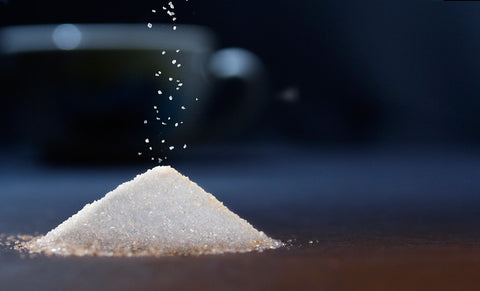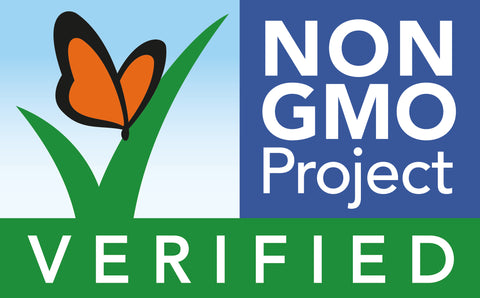
What are Polyols?
Polyols, also known as sugar alcohols, are organic compounds that contain one hydroxyl group attached to each carbon atom. The name "polyol" refers to their carbon compound structure as poly (many) and -ol (alcohol), although they do not contain actual alcohol.

How are they made?
Polyols can be derived from sugars, either naturally or produced industrially by hydrogenating sugars. They are made by fermenting natural sugars found in fruits and vegetables and are commonly produced from corn using enzymes to ferment the sugars. After fermentation, the white liquid is filtered, dehydrated, and crystallized into the sugar-like product enjoyed by many.
Note this image provided for reference uses sugarcane as the source plant, whereas the polyols we import are made from non-GMO corn.

Benefits of Polyols
Polyols are low GI sweeteners, which generally have low or zero GI scores, meaning they have limited to no effect on blood glucose levels. They are vegan and are commonly used in the food and beverage industry to produce sugar-free or low sugar products, while Xylitol is found in many oral hygiene products. Polyols are consumed by people looking to reduce their intake of refined and artificial sugars for various reasons, such as weight loss, general health, managing diabetes, or a Keto diet.
Types of Polyols
With consumer interest in healthier sugar alternatives, polyols are becoming more popular, and Erythritol is growing at the fastest rate due to its stability and relatively low production cost compared to other polyols. While there is no difference in the final product, organic certified polyols can be purchased, and non-GMO verified polyols are commonly used because of concerns about the negative side of GMO plants.
Polyols in Food Production
New Zealand's largest sugar producer owns a subsidiary that specializes in selling polyols to food manufacturers. Polyols are commonly used in the food and beverage industry to produce sugar-free or low sugar products, making them a popular ingredient for people looking to reduce their sugar intake.
How are polyols they produced?
Sugar alcohols are produced in the same way that high fructose corn syrup (HFCS) is produced. Each polyol uses a different enzyme to ferment the sugars found in the source plant - usually corn. The result of the fermentation process is a white liquid that is then filtered to remove any unwanted materials (sludge, proteins etc), dehydrated and crystalized into the sugar-like product we enjoy.
Polyol Market in New Zealand: Size and Growth Rate
According to recent market reports, the polyol market size in New Zealand is estimated to be around NZD 20-25 million. The overall growth rate of the polyol market has been steady in recent years, with an expected CAGR of 5-6% from 2021 to 2026. Erythritol is growing at the fastest rate among all polyols, with a projected CAGR of 7-8% during the same period. This is due to its stability and relatively low production cost compared to other polyols.
On the other hand, Xylitol is also experiencing steady growth, with a projected CAGR of 5-6% from 2021 to 2026, and it is commonly found in many oral hygiene products. Despite the smaller market size compared to other sugar alternatives, the growing consumer interest in healthier sugar alternatives is expected to continue driving the growth of the polyol market in New Zealand.
Sample of market research report (USD):

Where do polyols sit on the glycemic index (GI)?
Polyols are commonly used as a sugar substitute due to their low glycemic index (GI) score. GI measures the impact of carbohydrates on blood glucose levels. Polyols have a lower GI score compared to regular sugar, which means they have a minimal effect on blood sugar levels. This makes them an attractive option for people with diabetes or those who want to manage their blood sugar levels.
Generally, polyols have a GI score of 0 to 50, while regular sugar has a score of 60 to 70. Xylitol has a GI score of 13, while Erythritol has a GI score of 0, making it the most popular polyol among people looking to reduce their sugar intake. The low GI score of polyols also means they can be used in a wide range of foods and beverages without causing significant spikes in blood sugar levels.
You can learn more about GI in this blog post.
What about the "organic" status of sugar alcohols?
Technically speaking there is no difference in the final product, whether the source material is organic corn or not. The corn starch is fermented and converted into the polyol, which is in itself a new thing. That said, it is possible to buy organic certified polyols as they use organic byproduct as the source plant. This is considerably more expensive however, and as polyols make up the bulk of our blends we do not go so far as to buy these polyols. As prices come down, we will revisit this decision.
How about GMOs?
Similar to organic status, whether the source product is GMO or not, the final product is made as a result of a fermentation process which should in theory negate any negative properties of the source plant. That said, due to the negative side of GMO plants - chiefly the idea of pesticide resistance being built into their DNA and thus the heavy use of pesticides in their growing - we only source non-GMO verified products. We have confirmed these verifications ourselves with Food Chain ID, one of the original technical administrators for the Non-GMO Project Verified.

And Vegan?
In the same manner as with organic status as the source product is vegetable and the end product a result of a fermentation process, we do not see any issue for vegan people to consume polyols. We do have written statements from our suppliers to the effect that to the best of their knowledge there are no animal products included in the production of polyols, nor any known allergens (wheat, crustacean, dairy, etc). Our suppliers are all highly specialized in the production and manufacture and distribution of natural sweeteners and there should be no possible way for non-plant matter to enter the production cycle.
All of the above notwithstanding, we have not applied for Vegan Certification because of the time and cost required. We are not yet sure if there would be a positive benefit to us taking this step, but we will review it in due course.
What are the negatives of polyols?
While polyols offer a range of benefits and are generally considered safe, there are some potential negative side effects associated with their consumption. Some people may experience digestive issues, such as bloating, gas, and diarrhea, if they consume too much polyol. Therefore, it's generally recommended to consume polyols in moderation and follow the recommended daily intake guidelines.
The European Food Safety Authority has set an acceptable daily intake (ADI) of 0-0.8 grams per kilogram of body weight for several common polyols, such as erythritol and xylitol. It's important to note that this ADI is a guideline, and some individuals may be more sensitive to polyols than others. As with any food or supplement, it's always best to consult with a healthcare professional before adding polyols to your diet.
When it comes to taste, sugar is known for its sweet flavor that many people enjoy. Polyols like Erythritol or Xylitol also provide a sweet taste, but they can also have a cooling or minty sensation that some people may find different from the pure sweetness of sugar. Some like it, some don't.
To make it easier for newcomers to understand, we have decided to use the tagline "Not Sugar" on our new product line packaging. This will help consumers easily recognize the purpose of these products, both in New Zealand and in other markets where we operate. Our aim is to simplify the often complex chemical names associated with polyols, making it easier for consumers to make informed decisions about their sugar intake.
Sweetness of polyols
Polyols are known for their sweet taste and are commonly used as sugar substitutes due to their lower calorie content. They have a sweetness level that ranges from 40% to 100% of sucrose (table sugar) depending on the type of polyol. For example, Xylitol is equivalent in sweetness to sucrose, while Erythritol is about 60-70% as sweet as sugar.
The sweetness of polyols varies depending on factors such as concentration, the presence of other ingredients, and the individual's taste preferences. It is important to note that while polyols are sweet, they do not have the same mouthfeel or texture as sugar, which can affect the taste and overall eating experience of products containing them.

Summary
The chances are that if you are on our website, then you are not beholden to the taste of refined sugar or artificial sweeteners and are looking for healthier alternatives. In this case polyols are probably a good place to start and we hope the information provided here helps you make up your own mind on what is right for you.
If you find that polyols do not work for you, you may wish to try high intensity sweeteners like Stevia or Monk Fruit. Either way, and if you can find a natural sweetener that works for you as an additive or ingredient in your cooking, then that is a good thing.


